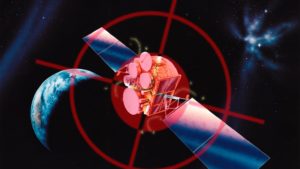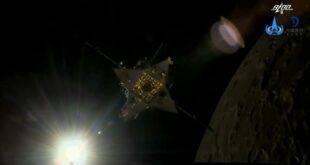
The recent pronouncement by President Donald Trump that called for the creation of a separate U.S. Space Force has been met with some consternation by a number of commentators around the world. This reaction seems more concerned with the controversial persona of President Trump rather than with the policy substance behind the rhetoric.
As strategic analysts, however, we are obliged to look beyond the flawed individual and pay attention to deeper currents and trends in the strategic environment. We are duty-bound to separate strategic insight and fact from salacious headlines and popular outrage. The call by President Trump for the creation of a separate U.S. Space Force, equal to the U.S. Army, Navy, and Air Force, is no different in this regard.
One does not have to like or agree with President Trump to understand that the debate about the need (or no need) for a U.S. Space Force has been rumbling among and between U.S. Air Force space operators and aviators for decades. Experts in national security space have been aware of this debate, and have even participated in it, over the years, including this author. It is irritating, therefore, to read claims made by people who hitherto have never participated in the separate space force debate that President Trump is somehow willfully “militarizing” space (space has been militarized since the late 1950’s) for no reason whatsoever other than yet another attempt by the man to cause outrage among civilized people.
As far as these commentators are concerned, nothing could be further from the truth. The call for the creation of a separate U.S. Space Force by President Trump is, in fact, the culmination of an internal strategic debate within the U.S. national security space community for several years now. The intellectual antecedents for President Trump’s position can be traced directly back to decisions made on U.S. military space issues during President Barack Obama Administration.
President Obama managed to upturn the traditional U.S. politics of military space by being a progressive Democrat who expressed concern to the U.S. Joint Chiefs of Staff about the vulnerability of U.S. satellites against increasing counterspace threats from China and Russia. This expression of concern resulted in a number of organisational reforms (especially in space acquisition), policy and doctrinal changes that took account of the increasingly threatening space environment, and a significant boost of the U.S. national security space budget.
These Obama initiatives are significant for a number of reasons. First, drawing on the political logic that only Nixon (a Republican) could have gone to China, only a progressive Democrat could establish a more hawkish U.S. policy in the space domain. Second, the initiatives drew relatively little criticism and alarm from U.S. friends and allies around the world.
Third, at a time when U.S. politics seems to be hopelessly fractured, the Obama national security space initiatives garnered rare bipartisan support in the U.S. House of Representatives and Senate. Lastly, for a large part of the second Obama administration, its top officials from the Departments of Defense and State and the Intelligence Community spoke in unison on Capitol Hill to public audiences and the media about the growing threat to U.S. space systems suggesting that there was consensus across the administration that the space threat was substantial. Furthermore, these officials briefed their foreign counterparts on the growing counterspace threat in bilateral and multilateral dialogues and their assessments found a ready audience.
It is in this context that President Trump’s call for a separate U.S. Space Force should be considered. The Trump Administration inherited from the Obama Administration the same intelligence assessments and expert national security space officials. Further, Trump Administration officials, like their predecessors, have been of one voice when it comes to warning Congress, the U.S. public, and friends and allies about the growing counterspace threat posed by China and Russia, and to a more limited extent, Iran and North Korea.
The extent of the counterspace threat, and what to do about it, is eminently debatable and good people can honestly disagree on these issues. But no one serious is in doubt that a counterspace threat exists, and the reaction to Trump’s call from U.S. friends and allies has been measured rather than excitable, as was the case in the 1980’s and 1990’s. This author’s informal discussions with a number of national security officials from U.S. allied and friendly countries in East Asia, South Asia, Middle East, and Europe suggests that the U.S. threat assessment of Chinese and Russian counterspace developments is widely shared.
President Trump’s call for a separate U.S. Space Force is just that – a call. For an actual separate Space Force to be created that is of equal political stature of the U.S. Army, Navy, and Air Force, a set of legal measures need to be enacted by Congress, followed by a number of significant organisational changes across the U.S. government. There is support for the Space Force among Congressional Republicans, most prominently by Representative Mike Rogers who chairs the Strategic Forces Subcommittee of the House Armed Services Committee that is responsible for U.S. national security space matters. Congressional Democrats are more sanguine, but are hardly hostile to the idea either, and most likely will not choose the Space Force as an issue with which to oppose President Trump given the far more contentious political issues at hand.
Chinese and Russian reactions to President Trump’s call for a Space Force have been predictable, but they should be taken seriously though not necessarily acquiesced to. Instead of blanket denials that were common from Soviet Union during the Cold War when confronted with their military space activities, today’s leaders in Beijing and Moscow openly boast and reference their military space capabilities and ambitions.
President Trump’s call for a separate U.S. Space Force appears to be a reaction to these capabilities and ambitions, rather than a political stunt, and on matters to do with space security analysts should observe the rule that we should take Trump seriously, but not necessarily literally. In other words, when it comes to a U.S. Space Force people should get over their outrage.
Dr. John B. Sheldon is the Chairman and President of ThorGroup GmbH, and publisher of SpaceWatch.Global. He has advised numerous ministries of defence and foreign affairs on national security space issues. This essay originally appeared in the Observer Research Foundation’s Space Alert, Volume VI, Issue 3, in July 2018.





